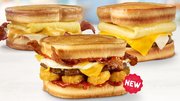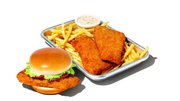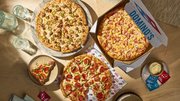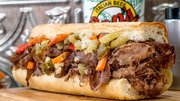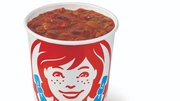Article
Beverage business keeps Dunkin' Brands growing full-steam ahead
The apparent evolution of the Dunkin' Donuts chain into a coffee-and-other-beverage-centric QSR is keeping the overall Dunkin’ Brands Group growing full-steam ahead, according to the company’s Q3 financial results.

October 20, 2016 by S.A. Whitehead — Food Editor, Net World Media Group
The evolution of the Dunkin' Donuts chain into a coffee-and-other-beverage-centric QSR is keeping the overall Dunkin' Brands Group going and growing full-steam ahead, according to the company's Q3 financial results released Thursday.
As a result, Dunkin' Brands Group, Inc., the parent company of both Dunkin' Donuts and Baskin-Robbins, declared a quarterly cash dividend of 30 cents per share of common stock. The payout on that will come Nov. 30 for shareholders of record at the close of business Nov. 21.
For the quarter ending Sept. 24, the company reported several major overall financial results:
- 2 percent comparable store sales growth for Dunkin' Donuts U.S.
- 0.9 percent comparable store sales decline for Baskin-Robbins U.S.
- Added 115 net new restaurants worldwide, including 56 new U.S. Dunkin' Donuts locations
- 1.3 percent decrease in revenues
- 18.8 percent increase in diluted EPS to 57 cents
- 15.4 percent increase in diluted adjusted EPS to 60 cents
"Our Dunkin' Donuts U.S. business delivered solid comps for the quarter, fueled by record-breaking beverage sales, with double-digit growth in the espresso and iced coffee categories. … We are very pleased with the direction of the company, and while we have much work to do, we are cautiously optimistic that our new five-part strategy for Dunkin' Donuts U.S., which focuses on coffee leadership, faster innovation, targeted value offers, digital leadership and an improved restaurant experience, will position the company to see healthy growth in the months and years ahead," said Dunkin' Brands Chairman and CEO Nigel Travis in a release on the earnings news.
Travis also noted the company made the following achievements in the third quarter:
- Surpassed 5 million members in DD Perks rewards program
- Opened world's 12,000th Dunkin' Donuts restaurant
- Hired leading restaurant executive, Dave Hoffmann, as Dunkin' Donuts U.S. and Canada president
- Announced launch of Dunkin' Donuts ready-to-drink iced coffee beverages in U.S. next year
Dunkin' Brands CFO Paul Carbone added the chain is now fully franchised, with no company-operated stores, thanks to the sale of the chain's sale of its remaining stores, which he said continued to an overall drop in revenues in the last quarter.
"In regards to restaurant-level economics, we are particularly encouraged by first-year cash-on-cash returns that franchisees are experiencing in our high-opportunity West and emerging markets. We will continue to focus on driving franchisee profitability by better serving the customer, building high-margin beverage sales, lowering store construction costs and simplifying store operations. Additionally, sales of Dunkin' Donuts- branded consumer goods through locations outside our restaurants, including our recently announced ready-to-drink iced coffee line, should drive Brand awareness, provide more opportunities for consumers to drink our coffee every day, and deliver profit-sharing income for our franchisees, including in our newest markets," stated Carbone in the release.
Global system-wide sales growth in the third quarter was primarily attributable to global store development and Dunkin' Donuts U.S. comparable store sales growth (which includes stores open 78 weeks or more). An increase in the average ticket drove Dunkin' Donuts U.S. comparable store Q3 sales growth, which was offset by a drop in traffic. Strong drink sales drove growth, led by iced coffee and breakfast sandwiches, of which the maple sausage and Belgian waffle offerings led the pack.
A decline in Q3 traffic led to negative Baskin-Robbins U.S. comparable store sales, though partially offset by increased average ticket. Warm cookies and donut ice cream sandwich sales, along with that of other cup and cone sales more than offset declining drink and sundae sales.
Q3 revenues dropped 1.3 percent or $2.7 million, compared to the prior year, due primarily to a drop in sales at company-operated restaurants and a drop in franchise fees due to declining gross openings and renewal income, as well as declining ice cream and other product sales in the Middle East.
All of the six remaining company-operated distribution points were sold by the end of Q3, but these decreased revenues were offset by more royalty income from better system-wide sales growth. Total revenues decreases were also offset by increased Dunkin' K-Cup pod licensing agreement license fees.
Q3 operating income and adjusted operating income grew $9.6 million, or 9.6 percent and $8.8 million, or 8.3 percent from the prior year due to increased royalty income, gains from the sales of company-operated restaurants and lower general and administrative expenses due to lower bad debt expense, offset by lower franchise fees.
Q3 net and adjusted net income grew $6.5 million, or 14.1 percent, and $5.8 million, or 11.5 percent compared to the prior year due to increased operating income and adjusted operating income of $9.6 million and $8.8 million, respectively, offset by higher income taxes.
Diluted earnings per share and diluted adjusted earnings per share grew 18.8 percent to 57 cents and 15.4 percent to 60 cents due to higher net income and adjusted net income, and fewer shares outstanding, due to share repurchases since Q3 2015, offset by the exercise of stock options.
FY 2016 target results updates:
- Baskin-Robbins U.S. comparable store sales growth should now be slightly positive, as compared to previous guidance of 1 to 3 percent
- Dunkin' Donuts U.S. net development is now expected to be at the low end of the previously-provided range of 430 to 460 net new restaurants, excluding Speedway self-serve coffee station closures
- Net income of equity method investments is now expected to be slightly higher than 2015 full-year results of $12.6 million, as compared to previous guidance of slightly lower than 2015 full-year results. The update is primarily driven by the reduction of depreciation and amortization of its Japan joint venture as a result of the impairment charge recorded in fiscal year 2015
- Revenue growth is now expected to be approximately 2 percent on a 53-week basis with the last week being worth approximately 100 basis points. The update is primarily driven by weaker-than-expected sales of ice cream products related to its Baskin-Robbins International segment
About S.A. Whitehead
Pizza Marketplace and QSRweb editor Shelly Whitehead is a former newspaper and TV reporter with an affinity for telling stories about the people and innovative thinking behind great brands.
 ChatGPT
ChatGPT Grok
Grok Perplexity
Perplexity Claude
Claude
